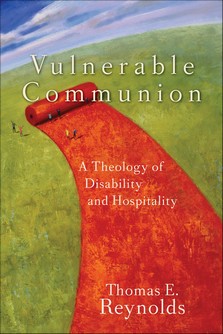Excerpt from my Book Review Paper of – “Vulnerable Communion: A Theology of Disability and Hospitality” -by Thomas E. Reynolds
copyright Lisa Colón DeLay © 2010
Caring Stops at Fear
To put it bluntly, the problem lies in the fact that what we hate and fear is personified in a disable person. What we grieve and pity on a grander scale about human existence can be seen in the disabled. What we dread about ourselves, or how the broken world can be, takes on fleshly form, right in front of us, in the acute helplessness of the disabled one.
On a gut level, we realize at some point we too may be helpless and dependent. It seems frightening. We feel weak, inferior, and can be dreadfully aware of our imperfections. We resent being reminded of it. We also fear that grace will not abound for us in these cases. Consequently, we hope the subject does not come up, or that the disabled stay a bit out of view. Disabilities are variations of the vulnerable life that God has given us. They are too, the life he lived out, in human form. It seems a most basic dilemma of human existence is whether there is welcome when it is most needed. Can we can find a safe place to abide, and be with others who recognize us, value us, and empower us to become our best selves. We remain insecure.
Interdependence
Reynolds asserts that the Christian story is, and has been, one of strength coming from weakness, of wholeness emerging from brokenness, and of growth budding from vulnerability. This comes by the grace and almighty power of God. As able-bodied people, we underestimate our need. We admire, idolize, and pursue independence, on all levels.
In contrast, the common good is not achieved unilaterally (individually), or selfishly. The disabled understand experientially what the able-bodied can only know partially, and, by in large, theoretically: we need relationships in order to exist. As we embrace our vulnerability and mature to depend on other, we become more fully human. Weakness, in the interdependence played out as servant host and guest, gives us the privilege of reliance, vulnerability, and the opportunity to pursue abundant life together. It is part of how we develop in trust and faith.
Reynolds delves into theological issues, related to Trinitarian theology. They are discussed in terms of God and his creation, Jesus’ redemption and interaction with humanity, and the Spirit in the context of the Spirit-filled church living as a vulnerable inclusive communion in the redemptive kingdom of God.
Your comments and ideas are encouraged. Please post them.









